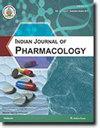Implementing pharmacogenetic testing to optimize proton-pump inhibitors use among Indian population based on CPIC-CYP2C19-PPI dosing guidelines: The need of the hour.
IF 1.5
4区 医学
Q4 PHARMACOLOGY & PHARMACY
引用次数: 0
Abstract
Proton-pump inhibitors (PPIs) are widely prescribed to decrease stomach acid and treat various acid-related Gastrointestinal tract (GIT) diseases. However, genetic variations, particularly in the CYP2C19 gene, affect PPIs metabolism and efficacy. Variants in CYP2C19 can result in different rates of PPI metabolism, influencing their effectiveness. Personalized medicine strategies, such as genotyping for CYP2C19, have the potential to enhance the effectiveness of PPI therapy and patient safety. This review aims to describe the relevance of CYP2C19 genetic profiling in the indian population, including normal function (e.g. CYP2C19*1, *11, *13, *15, *18, *28, and 38), decreased function (e.g., CYP2C19*9, *10, *16, *19, *25, and 26), loss of function (e.g., CYP2C19*2, *3, *4, *5, *6, *7, *8, *22, *24, *35, *36, and *37), and increased function (e.g., CYP2C19*17) variants. This review also examines the clinical pharmacogenomics implementation consortium (CPIC)-CYP2C19-PPI guidelines to highlight the importance of pharmacogenomics (PGx)-informed personalized PPI therapy for gastroesophageal reflux disease and peptic ulcer disease treatment. On average, each person in India possesses eight pharmacogenetic (PGx) variants that can be clinically significant, underscoring the need for preemptive testing. Implementing CYP2C19 genetic testing in India requires expanding laboratory capacity, increasing accessibility in primary care, increasing public awareness, collaboration between pharmacovigilance and PGx programs, investing in advanced sequencing technologies, data management systems, and integration with electronic health records and clinical decision support systems. Addressing challenges such as genetic diversity, socioeconomic factors, health-care access issues, and shortage of trained professionals is essential for implementation. Due to the lack of definitive country-specific policies and PGx guidelines from Indian drug regulatory agencies, guidelines from international consortia such as the Clinical Pharmacogenetics Implementation Consortium and drug labeling offer crucial foundational evidence. This evidence can be used to enhance patient outcomes and ensure the safe and effective use of PPIs in India.根据 CPIC-CYP2C19-PPI 剂量指南,在印度人群中实施药物基因检测,以优化质子泵抑制剂的使用:当务之急。
质子泵抑制剂(PPIs)被广泛用于减少胃酸和治疗各种与胃酸有关的胃肠道(GIT)疾病。然而,基因变异,尤其是 CYP2C19 基因的变异,会影响 PPIs 的代谢和疗效。CYP2C19 基因变异会导致 PPI 代谢率不同,从而影响其疗效。个性化医疗策略(如 CYP2C19 基因分型)有可能提高 PPI 治疗的有效性和患者的安全性。本综述旨在描述 CYP2C19 基因图谱分析在印度人群中的相关性,包括正常功能(如 CYP2C19*1、*11、*13、*15、*18、*28 和 38)、功能减退(如 CYP2C19*9、*13、*15、*18、*28 和 38)、CYP2C19*9、*10、*16、*19、*25 和 26)、功能丧失(如 CYP2C19*2、*3、*4、*5、*6、*7、*8、*22、*24、*35、*36 和 *37)以及功能增强(如 CYP2C19*17)变体。本综述还研究了临床药理基因组学实施联盟(CPIC)-CYP2C19-PPI 指南,以强调以药物基因组学(PGx)为依据的个性化 PPI 治疗对胃食管反流病和消化性溃疡病治疗的重要性。在印度,平均每个人都有八个药物基因组学(PGx)变异,这些变异可能具有重要的临床意义,这就强调了预先检测的必要性。在印度实施 CYP2C19 基因检测需要扩大实验室能力、提高初级保健的可及性、提高公众意识、药物警戒与 PGx 项目之间的合作、投资于先进的测序技术、数据管理系统以及与电子健康记录和临床决策支持系统的整合。应对基因多样性、社会经济因素、医疗保健普及问题和训练有素的专业人员短缺等挑战对于项目的实施至关重要。由于印度药品监管机构缺乏针对具体国家的明确政策和 PGx 指南,临床药物遗传学实施联盟等国际联盟的指南和药品标签提供了重要的基础证据。这些证据可用于提高患者的治疗效果,确保在印度安全有效地使用 PPIs。
本文章由计算机程序翻译,如有差异,请以英文原文为准。
求助全文
约1分钟内获得全文
求助全文
来源期刊
CiteScore
4.00
自引率
4.20%
发文量
53
审稿时长
4-8 weeks
期刊介绍:
Indian Journal of Pharmacology accepts, in English, review articles, articles for educational forum, original research articles (full length and short communications), letter to editor, case reports and interesting fillers. Articles concerning all aspects of pharmacology will be considered. Articles of general interest (e.g. methods, therapeutics, medical education, interesting websites, new drug information and commentary on a recent topic) are also welcome.

 求助内容:
求助内容: 应助结果提醒方式:
应助结果提醒方式:


